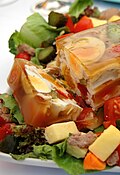Boiled egg
Boiled Egg
A boiled egg is a common food item, prepared by boiling an egg in its shell in water. Depending on the desired level of doneness, the egg may be cooked for varying lengths of time, resulting in a range of textures from a runny yolk to a fully set yolk.
Preparation[edit]
To prepare a boiled egg, the egg is typically placed in a pot of cold water, which is then heated to a boil. Once the water is boiling, the heat is reduced and the egg is left to cook for a desired amount of time. The cooking time can vary depending on the size of the egg and the desired level of doneness.
Types of Boiled Eggs[edit]
There are several types of boiled eggs, including:
- Soft-boiled egg: This type of boiled egg is cooked for a shorter amount of time, resulting in a runny yolk and a partially set white.
- Hard-boiled egg: This type of boiled egg is cooked for a longer amount of time, resulting in a fully set yolk and white.
- Medium-boiled egg: This type of boiled egg is cooked for a medium amount of time, resulting in a partially set yolk and a fully set white.
Nutritional Value[edit]
Boiled eggs are a good source of protein, vitamin D, and vitamin B12. They also contain other nutrients such as iron, zinc, and selenium.
Uses[edit]
Boiled eggs are used in a variety of dishes, including salads, sandwiches, and deviled eggs. They can also be eaten on their own, typically with a sprinkle of salt and pepper.
See Also[edit]
Boiled_egg[edit]
-
Soft-boiled egg
-
Boiled eggs, increasing in boiling time from left to right
-
Hard boiled egg
-
Hakone black egg
-
Boiled egg in ramen
-
Aspic with eggs
-
Pickled egg
Ad. Transform your life with W8MD's Budget GLP-1 injections from $75


W8MD offers a medical weight loss program to lose weight in Philadelphia. Our physician-supervised medical weight loss provides:
- Weight loss injections in NYC (generic and brand names):
- Zepbound / Mounjaro, Wegovy / Ozempic, Saxenda
- Most insurances accepted or discounted self-pay rates. We will obtain insurance prior authorizations if needed.
- Generic GLP1 weight loss injections from $75 for the starting dose.
- Also offer prescription weight loss medications including Phentermine, Qsymia, Diethylpropion, Contrave etc.
NYC weight loss doctor appointmentsNYC weight loss doctor appointments
Start your NYC weight loss journey today at our NYC medical weight loss and Philadelphia medical weight loss clinics.
- Call 718-946-5500 to lose weight in NYC or for medical weight loss in Philadelphia 215-676-2334.
- Tags:NYC medical weight loss, Philadelphia lose weight Zepbound NYC, Budget GLP1 weight loss injections, Wegovy Philadelphia, Wegovy NYC, Philadelphia medical weight loss, Brookly weight loss and Wegovy NYC
|
WikiMD's Wellness Encyclopedia |
| Let Food Be Thy Medicine Medicine Thy Food - Hippocrates |
Medical Disclaimer: WikiMD is not a substitute for professional medical advice. The information on WikiMD is provided as an information resource only, may be incorrect, outdated or misleading, and is not to be used or relied on for any diagnostic or treatment purposes. Please consult your health care provider before making any healthcare decisions or for guidance about a specific medical condition. WikiMD expressly disclaims responsibility, and shall have no liability, for any damages, loss, injury, or liability whatsoever suffered as a result of your reliance on the information contained in this site. By visiting this site you agree to the foregoing terms and conditions, which may from time to time be changed or supplemented by WikiMD. If you do not agree to the foregoing terms and conditions, you should not enter or use this site. See full disclaimer.
Credits:Most images are courtesy of Wikimedia commons, and templates, categories Wikipedia, licensed under CC BY SA or similar.
Translate this page: - East Asian
中文,
日本,
한국어,
South Asian
हिन्दी,
தமிழ்,
తెలుగు,
Urdu,
ಕನ್ನಡ,
Southeast Asian
Indonesian,
Vietnamese,
Thai,
မြန်မာဘာသာ,
বাংলা
European
español,
Deutsch,
français,
Greek,
português do Brasil,
polski,
română,
русский,
Nederlands,
norsk,
svenska,
suomi,
Italian
Middle Eastern & African
عربى,
Turkish,
Persian,
Hebrew,
Afrikaans,
isiZulu,
Kiswahili,
Other
Bulgarian,
Hungarian,
Czech,
Swedish,
മലയാളം,
मराठी,
ਪੰਜਾਬੀ,
ગુજરાતી,
Portuguese,
Ukrainian







